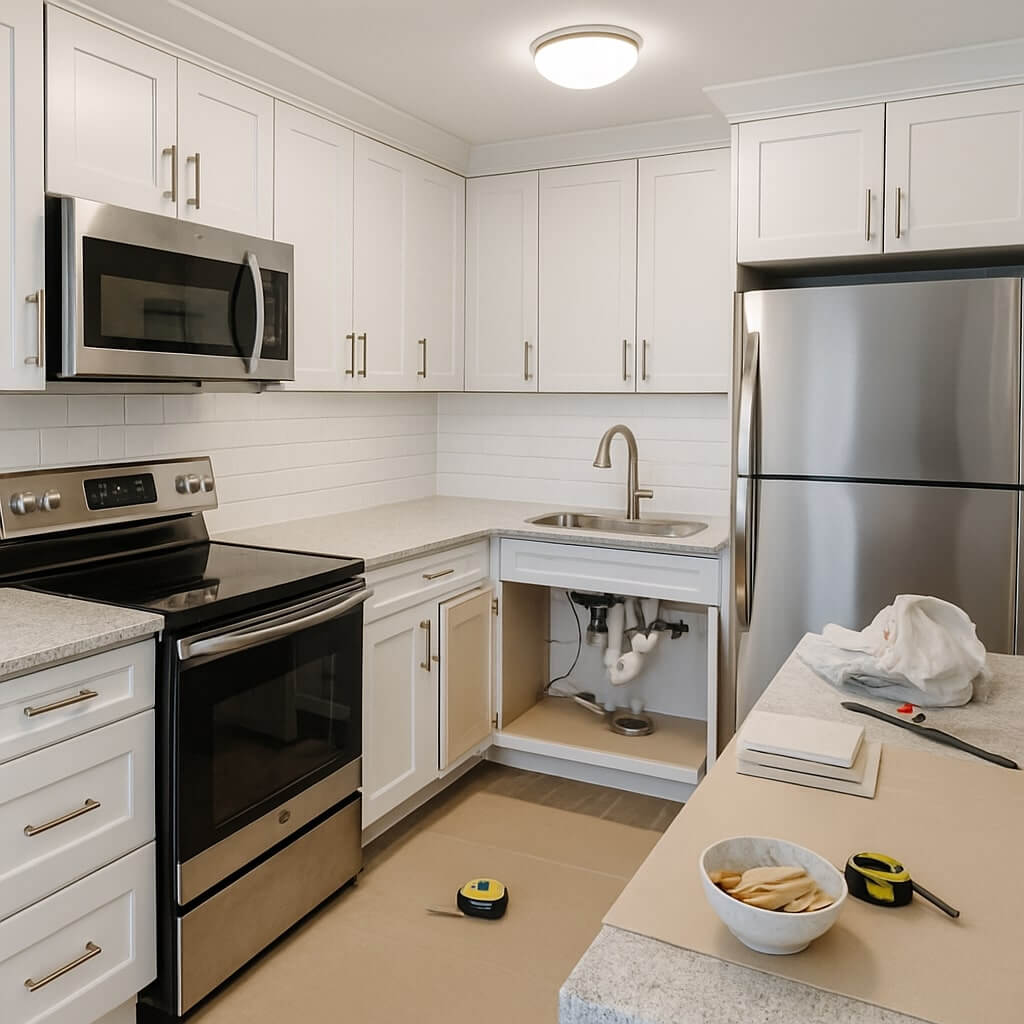When you’re planning a condo kitchen remodel, it’s essential to understand the various costs involved. From cabinetry and hardware to appliances and flooring, each element can greatly impact your budget. You’ll need to take into account the price of plumbing fixtures and electrical work as well. Knowing these common expenses can help you make informed decisions. But what about those hidden costs that might catch you off guard? Let’s explore the details further.
Key Takeaways
- Cabinetry and hardware selections can significantly impact costs, typically ranging from 30% to 50% of the total remodel budget.
- Energy-efficient appliances may have higher upfront costs but can lead to substantial long-term savings on utility bills.
- Lighting upgrades, including ambient and task lighting, enhance kitchen functionality and aesthetics, with installation costs varying widely based on complexity.
- Material choices for countertops, such as granite, quartz, or laminate, influence both durability and budget, with granite being the most expensive option.
- Labor costs for skilled tradespeople, including electricians and plumbers, typically range from $30 to $70 per hour, affecting overall project expenses.
Cabinetry and Hardware
When you commence on a condo kitchen remodel, cabinetry and hardware often represent a significant portion of your budget, so it’s crucial to choose wisely.
Start by evaluating different cabinet styles, such as Shaker, flat-panel, or traditional, to find what complements your space. Consider the layout and overall design when making your decision.
Next, focus on hardware finishes—matte black, brushed nickel, or polished chrome can dramatically affect the kitchen’s aesthetic. Confirm your selections align with your budget while enhancing functionality.
Countertops
When selecting countertops, you’ll need to take into account the variety of materials available and their associated costs.
Installation labor can also impact your budget considerably, so it’s essential to account for those expenses.
Finally, think about maintenance and longevity, as these factors will influence both your immediate and long-term satisfaction with your investment.
Material Choices and Prices
While selecting the right countertop material for your condo kitchen remodel, it’s essential to balance aesthetics with functionality and budget.
Granite offers stunning aesthetic appeal and exceptional material durability, making it a popular choice despite its higher cost.
Quartz provides a similar look with lower maintenance, while laminate is a budget-friendly option, sacrificing some durability.
Solid surface materials like Corian combine beauty and ease of repair but mightn’t withstand heat as well.
Consider your cooking habits and design preferences to guarantee you choose a countertop that not only enhances your kitchen’s appearance but also meets your practical needs.
Installation Labor Expenses
Although you may find the perfect countertop material, the installation labor expenses can greatly impact your overall budget.
Factors influencing these costs include:
- Installation Techniques: Complex installations, like custom cuts, require skilled labor, raising costs.
- Labor Market: Prices fluctuate based on local demand and availability of skilled installers.
- Type of Countertop: Heavier materials, such as granite, may incur higher labor costs due to special handling.
- Timeframe: Rushed projects may lead to premium rates, so planning ahead can save you money.
Understanding these elements will help you budget effectively for your remodel.
Maintenance and Longevity Factors
Understanding the maintenance and longevity factors of your chosen countertop can greatly influence your long-term satisfaction and costs.
To guarantee durability, prioritize preventive maintenance like regular cleaning with appropriate products, avoiding harsh chemicals that can damage the surface. For natural stone, consider sealing every few years to prevent stains.
If you’ve opted for laminate, be cautious with heat and moisture. Longevity tips include using cutting boards to avoid scratches and coasters for hot items.
Appliances
When planning your condo kitchen remodel, selecting the right appliances can greatly impact both functionality and budget.
Focusing on energy efficiency can save you money in the long run. Here are some tips to guide your selection:
- Research appliance brands known for durability and efficiency.
- Compare models based on energy ratings to lower utility bills.
- Consider size and layout to optimize space and workflow.
- Factor in installation costs, as complex setups can increase your budget.
Investing wisely in appliances now can enhance your kitchen’s performance and appeal, ensuring a successful remodel.
Flooring
After you’ve chosen the right appliances, the next significant aspect of your condo kitchen remodel is flooring.
You’ll want to explore various tile options, as they offer durability and style. Popular flooring trends include large-format tiles that create a seamless look and patterned tiles that add visual interest.
Consider materials like porcelain or ceramic for their resilience against spills and scratches. Additionally, if you’re aiming for warmth, luxury vinyl planks mimic hardwood while being easier to maintain.
Ultimately, select flooring that complements your overall design and meets your lifestyle needs, ensuring both functionality and aesthetic appeal in your kitchen.
Plumbing Fixtures
When considering plumbing fixtures for your condo kitchen remodel, you’ll want to look at various types, from faucets to sinks, each offering unique benefits.
Understanding installation costs is essential, as these can vary considerably based on the complexity of your choices and your existing plumbing setup.
Additionally, think about maintenance considerations; some fixtures require more upkeep than others, which can impact long-term expenses.
Fixture Types Overview
Plumbing fixtures are essential components that not only enhance the functionality of your condo kitchen but also contribute greatly to its aesthetic appeal.
When choosing fixtures, consider the following:
- Faucets: Available in various fixture styles like pull-down, pull-out, or wall-mounted.
- Sinks: Options include undermount, farmhouse, or drop-in, each offering different fixture materials.
- Garbage Disposals: Essential for waste management, with varying power capacities.
- Water Filtration Systems: Improve water quality and can be integrated with existing fixtures.
Installation Costs Breakdown
Understanding the costs associated with installing plumbing fixtures in your condo kitchen can save you both time and money.
When planning your kitchen layout, consider the complexity of moving existing plumbing versus keeping fixtures in place. Installation costs vary based on labor rates and the type of fixtures chosen.
For example, a simple sink replacement may range from $200 to $600, while a full installation with new piping can exceed $1,500.
Be mindful of your renovation timeline, as delays in plumbing can push back your entire project. Budgeting accurately guarantees a smoother and more efficient remodel process.
Maintenance Considerations
After investing in new plumbing fixtures, it’s important to take into account how to maintain them effectively to guarantee longevity and peak performance.
Implementing preventive maintenance can lead to long-term savings, avoiding costly repairs down the road. Here are some key practices to follow:
- Regularly inspect for leaks and corrosion.
- Clean aerators and showerheads to prevent buildup.
- Check water pressure; high pressure can damage fixtures.
- Flush drains monthly to prevent clogs.
Electrical Work
How do you guarantee your condo kitchen remodel meets both your design goals and safety standards? Proper electrical work is vital. You’ll need wiring upgrades to support new appliances and make sure your circuit capacity can handle increased loads. Hiring a licensed electrician is essential to avoid safety hazards and code violations.
| Task | Estimated Cost |
|---|---|
| Wiring Upgrades | $1,000 – $3,000 |
| Circuit Capacity Check | $200 – $500 |
| New Outlets | $150 – $300 each |
| Lighting Fixtures | $100 – $400 each |
Investing in quality electrical work enhances both functionality and safety.
Backsplash
When considering your backsplash, the material you choose can greatly impact your overall costs.
From classic ceramic to sleek glass, each option comes with its own price tag and installation labor expenses that you’ll need to factor into your budget.
Understanding these elements will help you make a more informed decision that aligns with both your style and financial plan.
Material Choices Impact Costs
Choosing the right backsplash can greatly influence your overall kitchen remodel costs, as various materials come with distinct price tags and aesthetic impacts.
Here’s how material quality affects your budget and look:
- Ceramic Tile: Affordable and versatile, it offers good durability but varies in design.
- Glass: High aesthetic appeal and easy maintenance, though it’s pricier.
- Natural Stone: Unique beauty and texture; costs can skyrocket depending on the type.
- Stainless Steel: Modern and sleek, but can be costly and may require special care.
Selecting wisely can balance both your budget and visual appeal.
Installation Labor Expenses
While the cost of materials is important, installation labor expenses for your backsplash can greatly impact your overall kitchen remodel budget.
Labor rates vary considerably based on your location and the installation techniques used. For instance, complex patterns or specialty materials might require skilled labor, resulting in higher costs.
On average, expect to pay between $30 to $70 per hour for professional installers. It’s vital to get multiple quotes to guarantee you’re not overpaying.
Additionally, consider the time frame for installation, as a longer project can increase labor costs, affecting your overall budget more than you might anticipate.
Lighting
Effective lighting can dramatically transform your condo kitchen, making it not just functional but also inviting.
To achieve the perfect balance, consider these essential lighting types:
- Ambient Lighting: Provides overall illumination, creating a warm and welcoming atmosphere.
- Task Lighting: Directs light to work areas, ensuring safety and efficiency while cooking and prepping.
- Accent Lighting: Highlights design features, adding a touch of elegance to your space.
- Under-Cabinet Lighting: Enhances visibility on countertops, making food preparation easier.
Labor Costs
Understanding labor costs is essential for budgeting your condo kitchen remodel effectively, as these expenses can greatly impact your overall project cost.
Labor rates vary considerably depending on your location and the complexity of your project. Skilled tradespeople, like electricians and plumbers, usually charge higher rates, so factor this into your budget.
Additionally, consider project timelines; longer projects may incur higher labor costs due to extended work hours.
To stay within budget, get multiple quotes and verify you’re clear about the scope of work. Proper planning will help you manage labor costs and keep your remodel on track.
Permit and Inspection Fees
Before diving into your condo kitchen remodel, it’s crucial to contemplate the permit and inspection fees that may apply to your project.
These costs can vary considerably based on your location and the scope of work. Here’s a quick breakdown:
- Building Permits: Required for structural changes.
- Electrical Permits: Necessary for new wiring or fixtures.
- Plumbing Permits: Needed for any plumbing alterations.
- Inspection Fees: Associated with verifying compliance with local codes.
Understanding these permit types and their inspection requirements will help you budget effectively and guarantee your remodel complies with local regulations.
Conclusion
When remodeling your condo kitchen, understanding these common costs can help you budget effectively. By carefully considering each expense—from cabinetry to appliances—you can make informed decisions that enhance both functionality and aesthetics. It’s essential to factor in labor and permit fees, as they can greatly impact your total investment. With careful planning and a clear vision, you’ll create a space that not only meets your needs but also adds value to your home.




